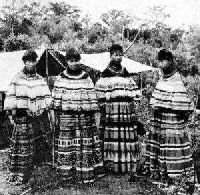 The consumptive poet Sidney Lanier agreed to do a guidebook on Florida, for Lippincott & Co., for $125 per month, travel expenses and the benefit he hoped the excursion would give to his health. The trip began in the spring of 1875 and the first edition of the book appeared late in the same year. The guidebook provides a solid description of the state at that time. Here he deals rather perfunctorily with the fate of the Seminole Indians.
The consumptive poet Sidney Lanier agreed to do a guidebook on Florida, for Lippincott & Co., for $125 per month, travel expenses and the benefit he hoped the excursion would give to his health. The trip began in the spring of 1875 and the first edition of the book appeared late in the same year. The guidebook provides a solid description of the state at that time. Here he deals rather perfunctorily with the fate of the Seminole Indians.The Everglades run through a large portion of Dade County and a part of Monroe. To the westward, in the space inclosed between the Everglades and the Gulf Coast, in Monroe County, dwell the remnant of the Indians who for so many years defied Spaniard, Frenchman, Englishman, and American, in this bloody Florida. In the year 1842, at the close of his remarkable campaign against the Florida Indians, General Worth announced to the Government that there remained but about three hundred of them -- men, women, and children -- and suggested that these be allowed to stay, without further pursuit, within specified limits -- being the space inclosed between Pease Creek, from its mouth along the southern fork of it, to Lake Istokpoga; thence down along that lake, the Kissimmee River, Lake Okeechobee, and the Everglades to the Gulf Coast; thence along the coast back to the starting point. This suggestion was finally acceded to, and with the exception of two insignificant disturbances quickly suppressed by State troops they have peacefully remained in their allotted territory, living mostly upon fish and game. They are said to retain their customs, and I met one resident of Florida who knew their old chief Tiger-tail, and had received an invitation to their Green-Corn Dance, then about to be held. Their number is now estimated to be about three hundred in all. They are seen by few whites, save the "cow-boys," and those dwelling in the lower portions of Orange County, and in Polk, Brevard, Manatee, and Dade.
Florida: its Scenery, Climate, and History by Sidney Lanier. Philadelphia: J. B. Lippincott & Co., 1876. (Baltimore: Johns Hopkins Press, 1945. 96-7. The JHP edition is a reprint of the second edition text with only page numbers altered.).
Also from the Library of Babel:
- Pierce Butler, Fanny Kemble, et al. July 22, 2020. ‘“An attempt of the Pennsylvania Supreme Court to make a way around the original Fugitive Slave Law, of 1793, by finding a private agent guilty of kidnapping for having remanded a slave from Pennsylvania to Maryland was forcefully overturned by the U. S. Supreme Court in Prigg v. United States (1842).”’
- The Best Translation of Dante’s Divina Commedia. July, 14, 2019. “For the next month, then, I put aside a few hours each night. Not only with Singleton and Merwin. In the glorious Age of the Internet, the first step could only be a search for what books relating to the subject were available on Google Book Search and the Internet Archive.”
- A Memoriam for W. S. Merwin. April 17, 2019. “It took about three days, as I recall, for me to surrender to the fact that W. S. Merwin was the finest English language poet of his time. I wished I’d been prepared to read him years ago.”
- Be sure to check out the Browser's Guide to the Library of Babel.


No comments:
Post a Comment